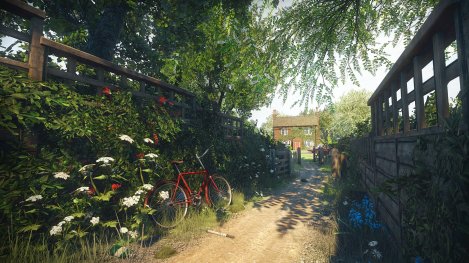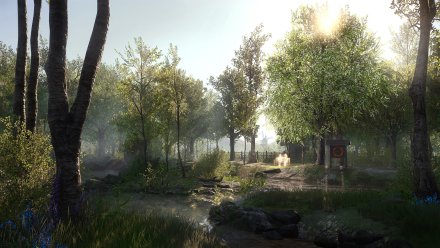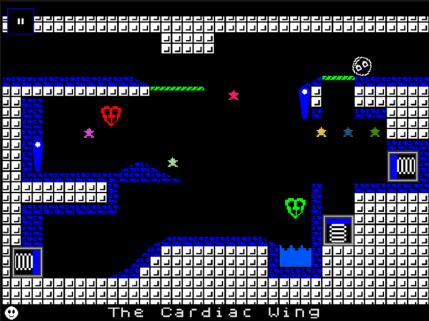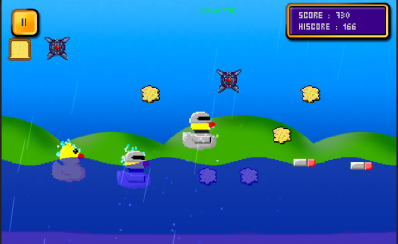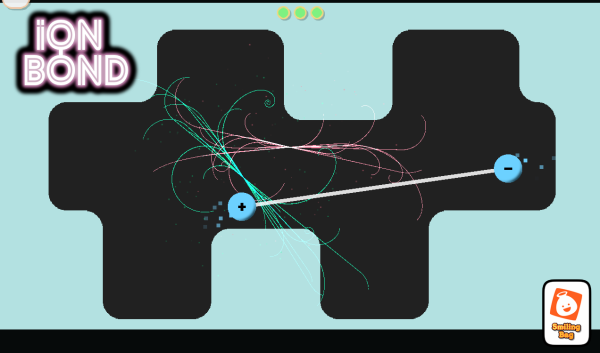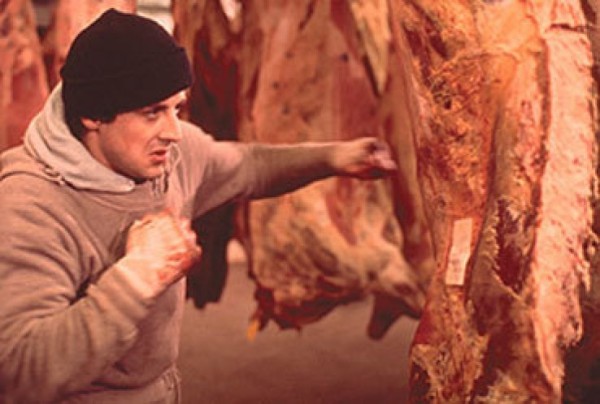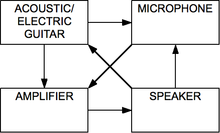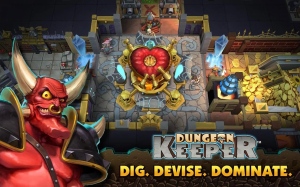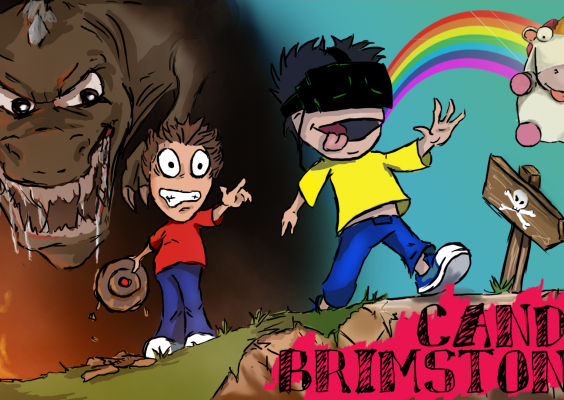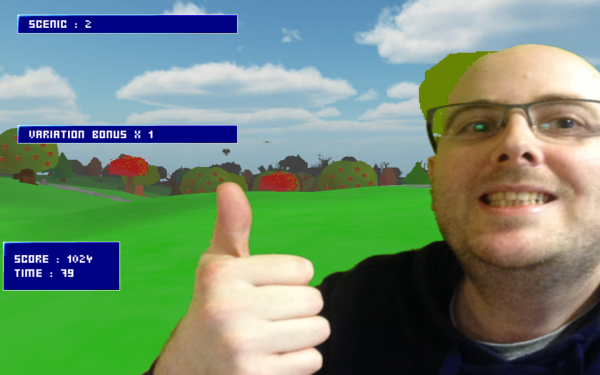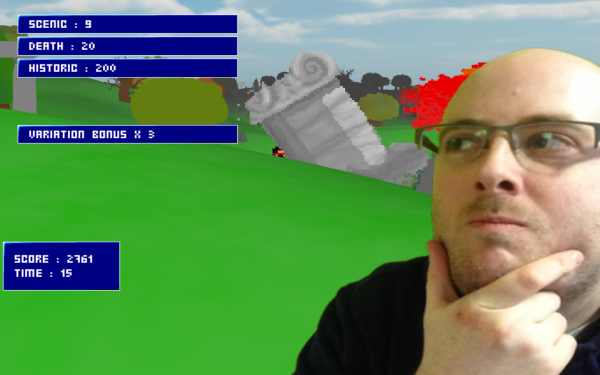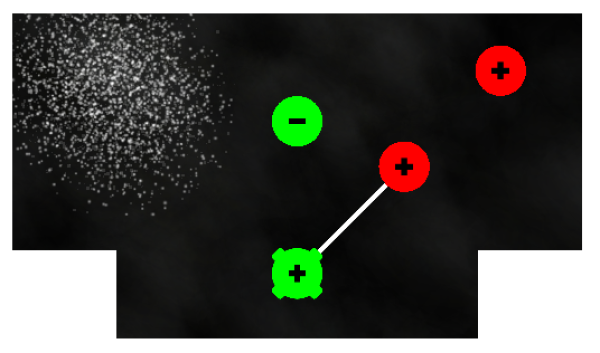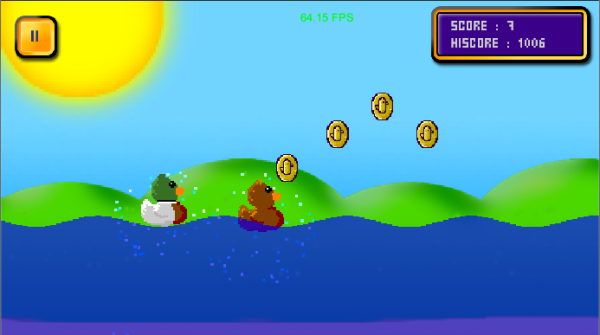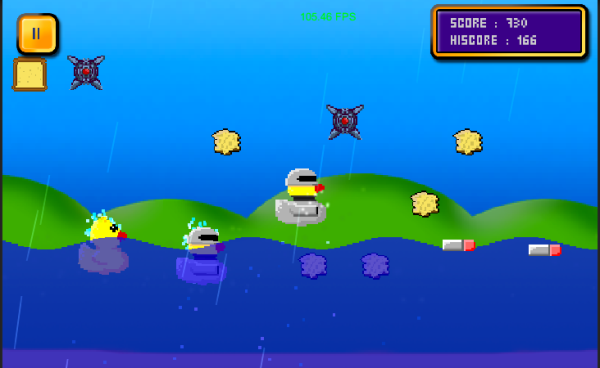GAME REVIEW : Everybody’s gone to the Rapture
Everybody’s gone to the Rapture is one of those games which forces us to question how games should be reviewed. It falls into a genre that has become unaffectionately known as a ‘Walking Simulator’, since that is the only action the player performs in the game besides from occasionally opening a door or turning on a radio. Other examples of the ‘Genre’ include ‘Gone Home’ and ‘The Vanishing of Ethan Carter’, so if you’ve played any of those then you know what you’re getting into here.
The controls are simple enough. The two thumb sticks are simply labeled ‘Keep looking’, and ‘Keep walking’. But obviously, the cynical term ‘Walking Simulator’ doesn’t do any of these games any justice. You need to approach these kinds of titles as you would approach a movie. And perhaps, then, it’s better to review it as if it were a movie too.
In that sense, it’s comparable to the work of Shane Carruth, director of ‘Primer’ and ‘Upstream Colour’, who tells complex and intricate stories by only showing you the most interesting moments, and leaving the viewer to fill in the blanks.
The setting in ‘Rapture’ is a small village in Shropshire, immediately after some kind of ‘event’ that has rendered the place deserted. The player, as a kind of virtual voyeur, has a free reign to explore the village and the surrounding area. You find yourself completely alone, aside from an ethereal, sentient light, which guides you towards ‘Flashbacks’. Scenes played out by actors comprised of lights, depicting moments captured in the days and weeks before ‘The event’.
It’s in these flashbacks where the emotional ‘meat’ of the game is to be found. The individual stories of the villagers deal with issues of conflict, abandonment, community, coping and separation, with each one culminating in an emotional crescendo. The conclusion to village clergyman Father Jeremy’s story proves particularly impactful as an opening chapter. To go into any real depth on the stories would do you, the reader, a disservice, as this is a game of discovery, and it’s better that you discover it yourself.
Most of the villager’s stories appear to end too soon, like they’re in the middle of some unfinished business, and that in itself is very powerful. After all, there’s no ‘Good’ time to get ‘Raptured’! There are lessons in the game, and there are questions. And many of these questions remain unanswered at the conclusion of the game, leaving the player to make their own mind up. Like the obvious conflict between science and religion, which so is easy to have an opinion on when it’s not happening. The game forces you to ask yourself where you would stand if it were?
Another comparison I’d make is with the playwright Samuel Beckett. Much of his work is situational, and lacks a plot. Asking you not to concentrate on what’s happening, but on how it makes you feel. In the case of ‘Rapture’, it made me want to hug all my loved ones, and to phone people who I hadn’t spoken to in years. And I think that alone makes it worth the asking price.
Hello everyone, and a happy new year. All of our iOS games free for the next week.
That’s I Am Level…
Ducky Fuzz
and Ion Bond
You can get them by following this link!
Some news about Smiling Bag…
It’s been a while since I posted on this blog. The Website, http://www.SmilingBag.co.uk has now taken over as the main outlet for news and this blog was meant to serve as my personal outlet for blog posts but I never really thought about exactly what kind of things I’d post here. Stuff about games? My own life? Politics? Never got round to it, so, I haven’t posted, but there’s some news now which I think does belong here.
I don’t post about health issues often, it’s not something I let interfere with my life in general, but it’s hit a point where it’s going to be interfering with Smiling Bag at the least, and also, I think I need to talk about it maybe as some form of catharsis? So, like my Twitter friend Lisa Lynch, who’s attitude towards health issues has been an inspiration to me although she will never know it, I’m going to ‘Blog it out’, starting with this post.
I’ve had health issues for a long time – congenital heart disease, far too complicated to explain here. And I’ve always known it was a ticking time bomb. For the most part I’ve been able to lead a reasonably normal life, but the last few years have seen a significant downturn.
Doctors have always delayed complex surgery because I’ve been doing so well, and the risks of acting were greater than the risks of leaving me as I was. So, while we’ve managed to holdback the onslaught through various drugs and treatments, we’ve always known that one day the balance would tip and the risk for some complex surgery would start to look preferable to the risk of leaving me as I am.
Unfortunately, a week before Christmas, the balance finally tipped.
That’s about all I can bring myself to say on the subject for now, other than to say it’s likely to be weeks rather than months. I’d like to move the post on to more positive things that have happened.
Given the circumstances, we decided to move our wedding date way forward. So we got married 2 days after Christmas, and it was the happiest day of my life despite everything. We’re sorry for everyone that would have wanted to be there, but we simply didn’t have any time to think or plan. You try organizing a wedding in 3 days (One of which is Christmas!)
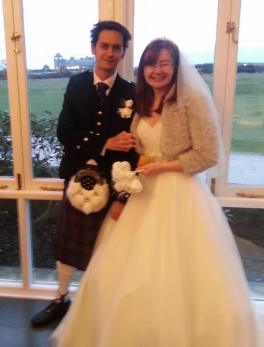
The other thing this is obviously going to effect is Smiling Bag’s current project, NanoSquid. I’m not sure when I’m going to get back on to this, and as many indies will know, once you move off a project it’s sometimes hard to move back onto it (If you do at all). So I’d like to share with you some early gameplay footage of what’s been done so far.
That’s all for now, other than to say we’ve been touched by everyone being so understanding, and the amount of goodwill flying around at this time of year has helped us cope much better. So, until next time. This is Stew, a.k.a. Smiling Bag, Signing off!
xxx
Smiling Bag Has A New Website
Hi all,
Just a quick note to let you all know that Smiling Bag has a new website at;
There’s a lot of reasons for the change. I’m about to release our third game, and I felt like the site really needed a front page and a proper structure rather than just being a blog. There’s a few more people getting more permanently involved with Smiling Bag’s games too, so we need something we can all contribute too, and that’s not just about me. The fact that I wanted a proper domain name that didn’t have wordpress in the title… yeah, loads of reasons!
I guess it’s simply because a free wordpress blog is limiting, and I feel like SB needs to step up a level now.
As for this blog, I’ll probably keep it going as a personal blog, so I’ll need to rename it at some point… maybe revert back to the old name. I’m not sure how that’s going to work, but for the time being I’ll leave it as a waystone to the new site for anyone who happens across it.
See you on the other site!
Stu xxx
Work in Progress : iON Bond
I’m working on a new game called ‘iON Bond’
It’s based on the Ludlum Dare game I made in January, but the concept has been expanded upon. The game is a puzzle game set inside a particle collider. It was inspired by the amazing images of cloud particle collisions that we’ve seen from the LHC and other particle colliders.
It’s a game about forming bonds between charged particles, which will cause them to influence their partners movement and trajectory, and eventually collide with other particles. The aim of each trial, initially, is to collide all the particles, although this changes as the game progresses.
It does have a narrative, and the narrative and the content of the game are sort of married. It’s as much a part of the design as the levels themselves. You’re a volunteer who has been selected to operate the new experimental collider, for reasons which will become apparent over the course of the game. The players are essentially playing ‘themselves’
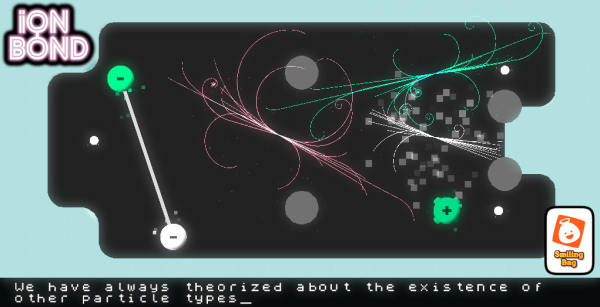
The levels attempt to ‘boil down’ things we see in our every day lives and represent them using particles and bonds. Things which seem huge to us are happening, allegorically, on a tiny scale all around us, trillions of times a second, without us even noticing. And while the game’s mechanics are only very loosely based on science fact, its narrative attempts to remain true to the principles of theoretical physics.
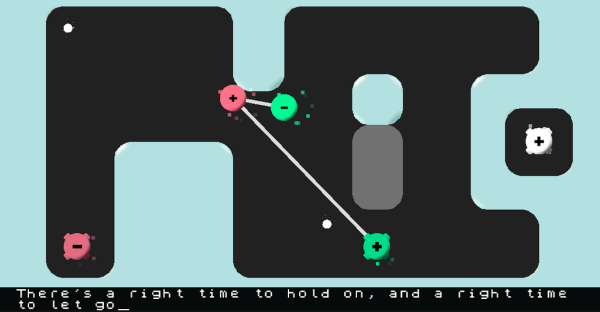
I’m aiming to launch on PC (and mac and linux) as well as iOS and Android devices, probably some time in early June.
I’m not doing a huge push for coverage right now, but any offered would be greatly appreciated. Just let me know if you need anything. Until then, follow this blog, or my Twitter account, if you want to keep up to date with the progress of the game. You can also follow it on the Indie DB page I’ve set up…
Thank you for sharing:)
Stu
Some Advice for Starting as a Freelancer in the Games Industry
I’ve been a freelancer for a few years now. That means I do work for hire. I move from company to company like the littlest hobo of game developers doing whatever needs done here and there. It’s not a glamorous life, but it’s an exciting one.
My motivation for becoming a freelancer was that I needed control over my workload, because I wanted the time and freedom to make my own games independently too, which is difficult when you’re working for a company full time.
It can be a tricky road, the whole freelancing thing, but for myself it’s been reasonably smooth sailing, and I think that’s largely down to the principles I set out for myself when I started. So I’d like to share them with you, along with some other stuff I’ve learned along the way.
1. Build your Confidence and Never Stop Learning
One of the main benefits of being a freelancer is being in control of your workload. Unlike a company employee, if someone approaches you with an unreasonable amount of work and wants it finished in a week, you can simply say ‘No thanks’ and not accept the contract.
This is also known as ‘Living the dream’
But, while it’s great to be able to say ‘no’, you should also put some thought into why you said it. Is it because it was unreasonable, or is it because you, personally, weren’t up to it?
There are a lot of freelancers out there, and most of them know more than one aspect of the game development process. It’s much harder to find freelance work in the games industry in a narrow field such as ‘Server Manager’ or ‘Logo Designer’, and they’re normally going to want someone with experience.
Most clients will want someone flexible who can cover more than one base. There are people out there who have a wide spread of knowledge and you need to be in that field too. For that reason, you should never stop the process of self improvement. Not only will you widen your contract options, you’ll enjoy the process, and contribute towards building your own confidence.
Another reason for building up your skill set is that for freelancers, the consequences of failure can be more severe than for employees. You can be dropped in an instant if you’re not meeting the requirements. Not only will you not get paid, but your reputation may be damaged, and that might make it difficult for you to get work in the future.
When you take a contract, you need to be sure that you can fulfil it. So keep building up your confidence and your ability.
2. Remember why you’re freelancing
The thing that puts most people off freelancing is that there is a chance, in fact a certainty, that there will be periods where you’ve got no work. During these periods, it’s easy to panic and grab the first contract that comes along, one which you aren’t really interested in, and often for cheaper than you would normally charge.
My advice would be to hold fast and stick to your rates and principles. If you became a freelancer so you had the freedom to control your workload, then what’s the point of having that freedom if you’re not going to exercise it.
Contracts do come along. I’ve turned down far more than I’ve taken on. If it’s not the right one for you, you don’t need to take it on.
A second piece of advice I’d like to share about the reality of freelancing, is that you should try to draw a hardline between work which is yours, and work you’re doing for someone else, and try and avoid crossing it. This is, I think, more important than for full time employees.
It’s easy to feel pride of authorship for your work, especially if you’ve made something that a lot of people gain enjoyment from, but it’s important to remember that if you’re doing work for someone else, then you are there as a facilitator and it’s likely that your time with the project will eventually come to a sharp end. You have no control over the project, or it’s future, so you need to be prepared to sever that tie and move on.
3. You will lose in life, just don’t lose the lesson
One unfortunate reality of being a freelancer is that you may occasionally get taken advantage of. And just to put this into perspective, I don’t just know one developer who has been ripped off, I know TONS, and I could write a whole other blog post about this subject alone. For the purposes of this piece though, I’ll stick to the bottom line…
If something doesn’t smell right, walk away.
Talking costs nothing, so engage in as much dialogue as you can upfront and don’t start work until both you and your client are happy with arrangements. If you become uncomfortable, talk it out and don’t continue until you are both happy.
If a client fails to pay you, under no circumstances should you do any more work with the promise of being paid down the line. It almost certainly will never happen.
Although you’re technically protected by the law to some extent, getting into that whole legal quagmire can be stressful and will usually end up costing you more money than the contract was worth. Personally, I think it’s better to nip it in the bud early and move on. Spend the time working on another contract. You’ll feel like they’ve won, but it will be better for you in the long run if you just walk away.
Oh… and beware of revenue shares.
The advantage of straight up work for hire is that you’ll definitely get paid, but if the project does well then you won’t see any extra cash, which can suck if you did a lot of work towards it. Sometimes, however, you may be offered a revenue share.
Revenue shares can be included in a contract to sweeten the deal. You might even consider dropping your rates a little if you’re getting a percentage of the profits. Just be aware that these things can be quite difficult to maintaining the long term.
If a client offers you a large revenue share but won’t be paying you for your work, you should be very cautious. Yes, if the project does well then it will be the gift that keeps on giving. But you’re under no guarantee that the project will do well, or that it will even be completed at all. Only do this if you can afford to take that risk, and you’re confident in the product and the client.
Incidentally, if anyone ever offers you something called a ‘Capped’ revenue share with no money upfront, you should consider it an insult. Make no mistake, this person knows exactly what they’re doing, and you’re being exploited. Capped revenue shares offer you neither of the advantages of work for hire or a standard revenue share. You’ll get nothing upfront and if it does well, they’re the only ones who will benefit long term.
My advice would be to hand them a list of charities that you donate to, and ask them to note that their name isn’t on it. 🙂
4. The Tax Man Cometh
A wee word about taxes.
When you start as a freelancer, you’ll need to register as self employed, and every year you will get taxed on the money you’ve earned. So you need to squirrel a bit away (around 30% – 40% to be safe).
But you knew that anyway right?
What ends up taking a lot of people by surprise is what happens in the first year.
In the first year of self employment, the government will bill you immediately for the year you’ve just worked, and they’ll assume you’re going to earn about the same next year too and will bill you for that right there and then as well, and at least half of next years will need to be paid by the following January. This means that in the first year you’ll effectively get a ‘Double’ tax bill.
This will only happen in the first year, because after that you’ll have already paid part or all of the previous year anyway, and if you don’t earn as much the following year then you’ll get part of it back, but it’s worth mentioning here because it certainly shocked the hell out of me that first year!
If you’re starting as a freelancer, I hope this advice helps. Remember though, this is just my own opinion based on what I’ve learned and experienced. Yours is a different story, and your principles may be different. But I would definitely recommend that you do think about them, write them down, and stick to them.
Good luck!
How to Positively Protest Games Industry Media Frenzies
If you stand facing an amp holding an electric guitar, you’ll start to hear an increasingly annoying ‘ringing’ noise known as audio feedback, or the ‘Larsen Effect’. The guitar pickup detects a sound coming out the speaker, feeds it back to the speaker, hears that same sound again, amplifies it and amplifies it until you’re deafened by the same sound amplifying itself over and over.
This is what it’s like in the games media whenever a big story breaks. The blogs and twitter feeds become a frenzy of noise with the same opinions being preached to people who already share the same view.
This year has barely started, and we’ve already had two major frenzies, first when every single outlet told us how Dungeon Keeper was the reason everything in the games industry was going to shit, and then again when hysteria and supposition about Flappy Bird led the creator to remove the game because apparently it all became too much.
We know, it’s rubbish…
I want (And as a developer, need) to engage with the games media, but I find it almost impossible. Every site seems to thrive off propagating hate and stirring up anger.
So if you’re a big name in games coverage, I plead with you to consider this…
For every article or tweet you write about how Candy Crush is destroying the app store, you probably left ten cries for help from small indie developers who are reaching out, struggling for coverage, festering away in your ‘Ignore’ box.
Cover them!
Positively protest the media frenzies by dedicating the time and effort you would spend on that article to instead covering new and upcoming unheard of developers rather than adding to the circus. Spread love, not hate. You never know, you might have Rorschach’s Journal sitting in your inbox. And at the very least, you’ll make someone’s day.

Or alternatively you could just write another article about how my opinions represent everything that’s wrong with indie developers today.
Global Game Jam 2014 – Selfie : The Videogame
I’m in the comedown phase of the Global Game Jam, Glasgow leg.
For those not lucky enough to have a lifestyle which allows them to work on their own projects full time, it’s easy to become cynical about developing games.
For this reason, the institution of ‘Game Jamming’ has never been more important. At a time where the soulless indifference of the ‘business’ of games is in the spotlight, we find a fortress where passionate developers get to be just that. Developers.
You only need to look at the number of entries with ‘Candy’ in their title to gauge just how strong the feeling is on this subject.
Candy Panda Saga
Anyway, the theme this year was a sentence…
“We don’t see the world as it is, we see it as we are”
A challenging theme, to say the very least!
We drew from this the notion of people who see themselves as the centre of their world, where everything else, no matter how beautiful, dangerous or emotionally challenging, was not really important. The kind of people who take ‘Selfies’.
The concept was inspired by the website ‘Selfies at Funerals‘, a website which showcases people taking photos of themselves at perhaps the most inappropriate of times (And which actually shut down when David Cameron and Obama took a selfie at Nelson Mandela’s Funeral). The gameplay is inspired by the photography minigame from ‘Dead Rising’, and the style by ‘Proteus’ and ‘Katamari’.
The world is ending, there is chaos all around, yet your objective is to take selfies. You get bonus points for taking them in front of rare and interesting things, and even more bonus points for variety (Everything has a category). So… Elvis Presley standing in front of a Stonehenge monument with a UFO flying overhead would score big!
The main character is a photorealistic image, but the background is deliberately simplistic and inconsistent. This was to symbolise that the character is the only ‘Real’ thing in their world. There is all this remarkable stuff happening all around them, yet half the view is obscured by their face.
The game got a great reaction, and everyone who played it left with a smile on their face. I’d definitely say this is the most fun I’ve ever had at a game jam. So… same time next year!
You can download and play the game from the ‘Global Game Jam’ page here : Link
Ludum Dare 28 : One Bond
(Can’t be bothered to read, link is at the bottom)
It’s been a long time since I did a Jam, so I decided to participate in Decembers Ludum Dare. First time I’ve ever taken part in Ludum Dare, and the first thing that struck me was the number of rules they have. Maximum of 48 hours, starting with a blank canvas, no using code or assets you’ve previously made, must work alone, no outsourcing… they all really help to level the playing field.
Anyway… the theme was “You only get one”, which after a few rounds of voting won by a huge margin. I came up with the idea of bonding charged particles together, but only one at a time. I called it “One Bond”
Initially, it started as a puzzle game where you would connect particles of opposite charges together in order to clear them from the screen, but over the course of the first day, as I added more features, I started to draw comparisons between the bonds and interactions of the particles in the game and other things. The movement of the planets, the wind, and people all over the world. So it became a game about ‘Particles and People’
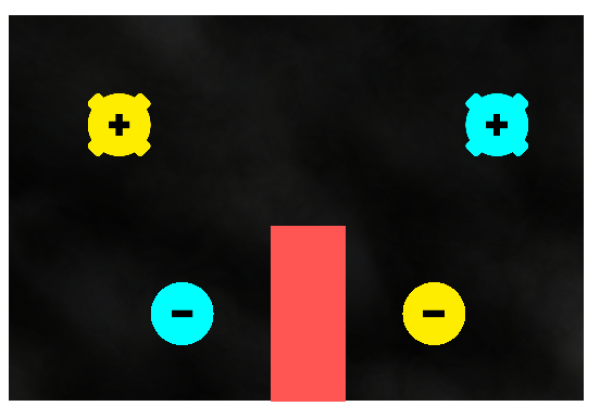 The whole thing came together fairly easily after that. All I had to do was think of something that people do, and then try and analogise that in the game. For example, people often lead us to where we want to be could become a level about particles steering other particles to their correct partners.
The whole thing came together fairly easily after that. All I had to do was think of something that people do, and then try and analogise that in the game. For example, people often lead us to where we want to be could become a level about particles steering other particles to their correct partners.
The results for the competition came out today, and ‘One Bond’ came in 27th place of the 1,284 entries (14th place in the innovation category), which I’m very happy with indeed.
I’ve decided that I’d like to turn it into a full product that this will most likely be the next full release from Smiling Bag. I’ve already made a whole bunch of changes to it (Most notably that you can now have more than one bond, so I guess I need to think of a new name!). Look out on this blog or my own Twitter feed for more information in the near future, but until then you can play ‘One Bond’ in its current form online.
Play ‘One Bond’ : Right Here
Work in Progress – Ducky Fuzz
Ducky fuzz is a simple game about juggling ducks on the ocean by controlling the waves, avoiding sea mines collecting as much bread as possible. Easy to play, difficult to master.
It’s a simple game, but it’s packed with content. Along the way there are many extra challenges to achieve. How many ducks can you juggle at once? Can you travel over 1000 nautical miles? Can you safely detonate 100 mines?
There are also puzzle stages, where you use a set number of ducks to clear a level, gaining a star rating depending on how well you did. And completing these challenges will unlock new duck costumes and special powers. You’ll see some surprising characters on your journey!
The game is an extension of a game I made a while back for the Experimental Gameplay Project called ‘Whistle Wave’, in which you controlled a wave by… well… whistling. Whilst the whistling thing didn’t really work, the idea of bouncing about on waves was appealing, so I wanted to go back to it.
The game is almost finished. Release date is currently ASAP, although begin the xmas period, there’s very little chance I will make an iOS launch before the 25th unless I rush it out, which I don’t want to do. Which means that Android people, you’ll probably get it a little sooner (before xmas), iOS people will need to wait a little longer. For more information, watch this blog, or follow us on Twitter.
Until then, here’s a trailer! And if anyone would like to cover this game and help out with promotion, please don’t hesitate to get in touch.
S
